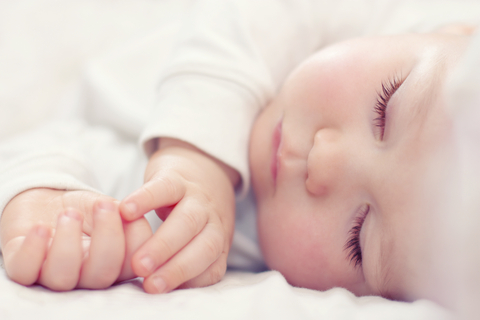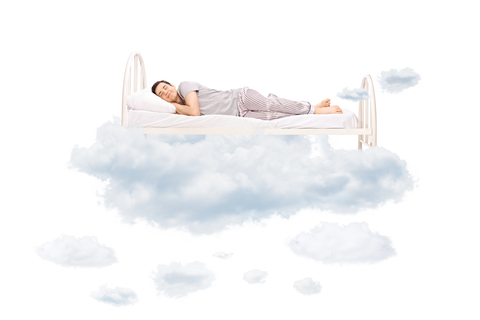Everyone sleeps a little differently, and we’ve all got our own preferences when it comes to getting some shut-eye. Unfortunately, it can sometimes be tough to get the sleep we want, and there might be a variety of reasons that are contributing to restless nights.
From what we wear and eat to what our bedrooms look like, we’ve pulled together a few tips and tricks to help ensure you’re relaxed before you doze off, and refreshed and cheery when the sun rises!

Relaxation
Magnesium, potassium, and calcium help your muscles relax, and are found in foods such as spinach, fish, bananas, and various seeds. Herbal teas made from valerian root or chamomile can have a soothing and relaxing effect which can also help you drift off.
Stimulants
High levels of fat, refined sugar, or starch can be difficult for your stomach to digest, meaning your body has to work hard while you sleep to process the food - which can cause you to sleep less deeply. Your body also turns Tyramine, found in things like pork, cheese, tomatoes, potatoes, and wine, into the stimulant noradrenaline, which can keep you up for a while.
Caffeine is a stimulant that can prevent your brain from shutting down when you need it to, however it affects people differently depending on the individual – if you have difficulties falling asleep, it may be best to avoid caffeine for around six hours before going to bed.
Alcohol may make it easier to fall asleep initially, however during the night it causes a drop in blood sugar, reduces the amount of time you are in REM sleep, and also dehydrates you, which can all lead to a less relaxed sleep.
Nicotine is also a stimulant that can keep you awake, and it can affect your sleep quality as you may experience nicotine withdrawal symptoms that can disrupt your night.
The clothes you sleep in are also important when it comes to getting a good night’s rest.
Comfort
A set of bedclothes or pyjamas should be comfortable and light – tight-fitting clothes can prevent blood from flowing under your skin and stop air from circulating, resulting in you overheating which can disrupt your sleep.
Material
The clothes should be made from a suitable material, which can be different for everyone. Cotton and satin are useful for staying cool while flannel can be good for keeping warm, and silk is generally fine for all weather but it can be expensive, and some may find it uncomfortable or slippery. Materials that are moisture-wicking prevent sweat from sticking to your body which can also increase your comfort levels.
Too hot or too cold?
Not everyone prefers a full set of pyjamas for bed – sleeping in little to no clothes can ensure breathability and prevent you from overheating, which in turn boosts production of melatonin and growth hormones that can boost your metabolism. It also leaves you feeling comfortable, which contributes to a deeper, more relaxed sleep. However, being too cold, can also disrupt your sleep, so deciding what level of clothing to sleep can very much depend on your room’s temperature and the time of year.

The position you sleep in can also influence how comfortable you feel and how well you sleep.
Sleeping on your Back
Sleeping on your back can prevent back and neck pain and help prevent acid reflux. However, it can also increase snoring and sleep apnoea, which can be difficult to deal with if you are sleeping with a partner.
Sleeping on your Side
Sleeping on your side can help prevent neck and back pain, acid reflux, snoring, and sleep apnoea, and it can be a good for pregnant women as it improves blood flow. However, it can put pressure on your lungs and other internal organs, and possibly constrict the muscles in your arms and shoulders.
Sleeping on your Front
Sleeping on your stomach can cause pain in your spine, put pressure on your muscles and joints, and restrict blood flow through your body. However, this position helps snoring and sleep apnoea as it opens the airwaves, making it easier to breath.
The atmosphere and environment of the room you sleep in affects how easy it can be to fall and stay asleep.
Temperature
The temperature should be set to your preferred level of comfort, taking into account the clothes you wear and the weather outside when you set the temperature.
Lighting It should also be as dark as possible when the lights are off, and if you keep a lamp in your room it should be dim and soft rather than a bright light. Light from computer screens can also affect your sleep, as the blue light it produces tricks your brain into thinking it is daytime. If you struggle to sleep from the outside lights or standby LEDs, an eye mask might help block out this light.
Scents & Sounds Adding a light scent such as lavender, jasmine, or vanilla can leave you feeling more relaxed and make it easier to fall asleep, while low and soothing sounds, such as white noise or loops of rainfall and waves can help your mind relax.

Mattress A good mattress should be somewhere between hard and soft, following the Goldilocks rule, to find a balance between supporting your body and reducing the restriction of blood flow. The perfect level will depend on you, but it can help to test a mattress before you invest as they can be expensive and should last you between 7-10 years.
Pillow
Your pillow should provide support for your head, shoulders, and neck. Adding an extra pillow either under your back (if you sleep on your back), between your knees (if you sleep on your side), or under your abdomen (if you sleep on your front), can offer extra support and help keep your spine in alignment. The firmness or softness of the pillow will depend on what you find comfortable.
Duvet
Your blanket or duvet should be made from a breathable fabric that wicks away moisture to keep you comfortable and dry during the night – choosing the material and thickness should depend on your climate and personal preferences.
For more tips and tricks, take a look at our animation video on how to get great sleep, or enjoy a deep slumber in any one of our comfortable hotel beds.
Most Royal Regions in the UKMaking up a large and significant part of the ...
MORE +The Second Names of Cities in the UK and Around the WorldThe Big Apple, The City...
MORE +Widely considered the beating, bustling heart of the North of England, Mancheste...
MORE +